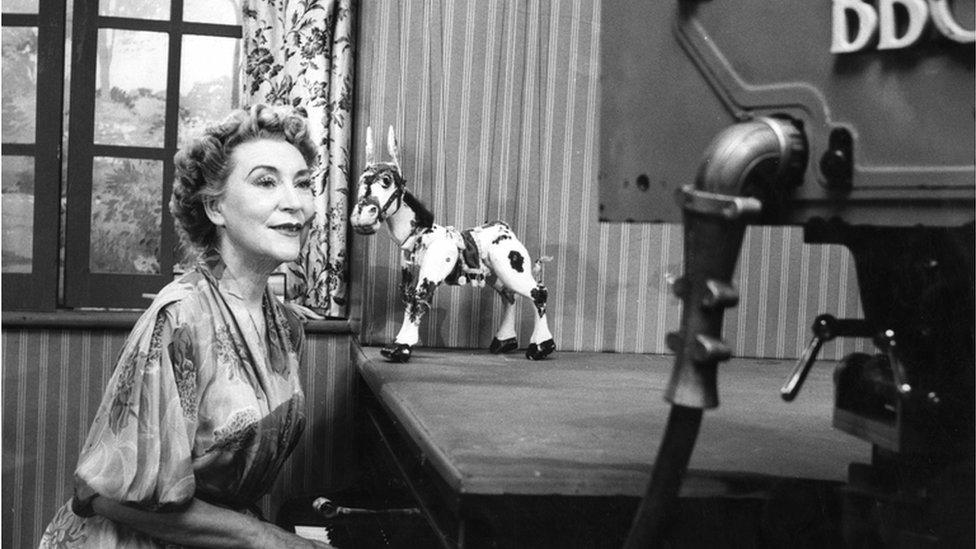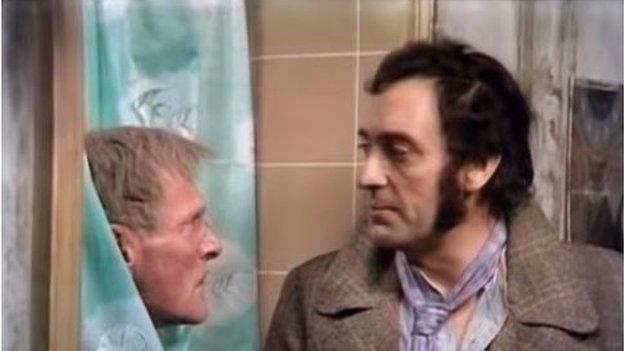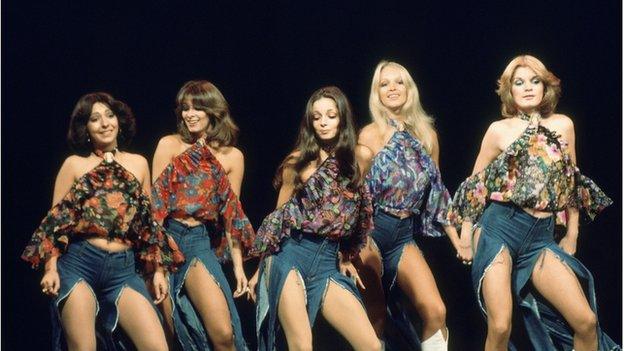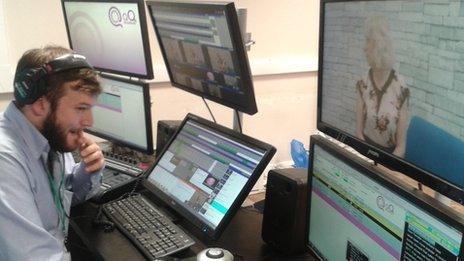Kaleidoscope - the men who found our 'lost' TV archives
- Published

Many people would be shocked to learn classic television, like episodes of Muffin the Mule, was simply deleted
They are programmes many will remember growing up with.
From Crossroads and Muffin the Mule, to Tiswas to Steptoe and Son, many people can recall the characters, the catchphrases and the jokes.
So it might shock viewers to learn that, instead of being archived on tape to be preserved for posterity, many recordings of these well-loved shows were simply wiped to save money.
Material was selected for preservation on the basis of its national importance or if it was deemed culturally significant.

Many famous names saw their work destroyed
The Beatles, Laurence Olivier, Michael Caine and Lenny Henry are just some of the famous names that saw their work destroyed.
Old programmes have now been digitised, although part of the sound is missing on the clip shown above
However, 25 years ago, a group of television enthusiasts from Dudley in the West Midlands decided to track down some of these "lost" shows.
The group of four students at King Edward VI college in Stourbridge founded what would become Kaleidoscope - a publishing and television archiving company.
"We were all very interested in the history of old TV," said Chris Perry, Kaleidoscope's managing director.

Some episodes of comedy classic Steptoe and Son had been deleted
"We were all a bit geeky. It was the early 80s and, at that time, there were hardly any repeats on television.
"Then, after 1982, Equity relaxed its rules and it was the first time we got to see older versions of shows like Dad's Army."
Mr Perry wrote to the BBC and found some episodes had simply not been saved.

The family of Bob Monkhouse gave the comedian's archive to Kaleidoscope
He and his friends set about tracking down these "lost" episodes.
"We started looking for lost footage at places like car boot sales and also things like trade fairs," he said.
"We had some success in the early days. We found the very first episode of the Likely Lads and a complete Muffin the Mule as well.
"But really there is so much footage out there that is still lost.
"You always hope you are going to find something really iconic. The best finds were things like Steptoe and Son and some of Pan's People's performances on Top of the Pops."
Kaleidoscope also managed to track down some early episodes of children's TV show Tiswas - albeit from an unlikely source.
"Not a lot of Tiswas was recorded when it first went out but that was around the time people were buying their own video recorders," said Lee Bannister, Kaleidoscope's studio director.
"One person who was recording Tiswas was the little boy who would dress up as a rabbit on the show and sing Bright Eyes from Watership Down.
"His name was Matthew Butler and around 10 years ago I met him and I discovered he recorded every single episode in which he appeared.
"What we've been able to do is take those tapes off him, digitise them, clean them up very carefully and resurrect the original programmes."
Today, Kaleidoscope holds 89,422 items of video tape or film and 14,312 paper records, including scripts and photographs, all stored at a warehouse in Dudley.
Of these, they believe 6,348 are unique to the company.
As Kaleidoscope's collection grew, it came to the attention of the big media organisations that had also developed an interest in trying to piece together their history.
In 1993, the company began working with the British Film Institute and later, the BBC and ITV.

The archive holds classic performances by Pan's People
As its reputation grew, it also became a trusted depository for celebrities.
In 2009, Bob Monkhouse's family gave the comedian's archive to the company.
"That led to other people, like the Jeremy Beadle estate, bringing their collections to us as well," said Mr Perry.
In 2014, Kaleidoscope won the licence to broadcast on a new local TV channel for the Birmingham and Black Country, which it named Big Centre TV.
The channel shows 10 hours of archive programming every week, including episodes of Crossroads and Ivor the Engine.
"We felt we needed a way to make use of this archive," said Mr Perry. "We always said if we had a way to show this material, we would do it, so people got to see some of these classics again.
"We wouldn't just leave them on a dusty shelf."
The story of Kaleidoscope is being broadcast on Inside Out on BBC One West Midlands at 19:30 on Monday 7 September and nationwide for 30 days thereafter on the iPlayer.
- Published28 February 2015

- Published28 February 2015
